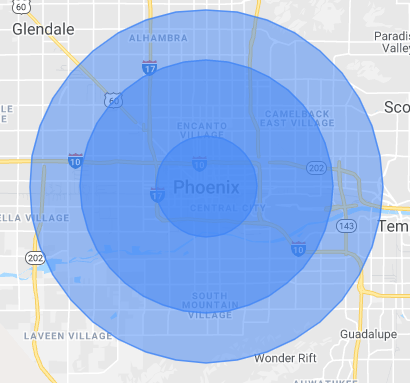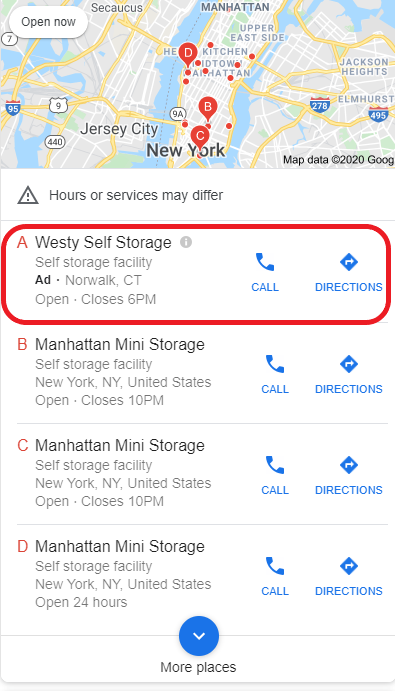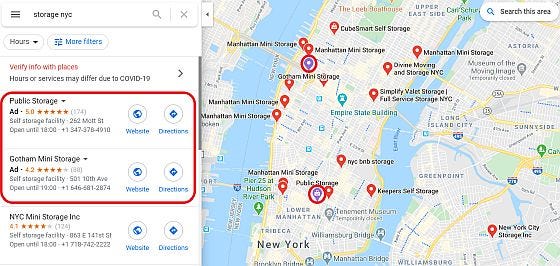Investing in Google Ads is a smart move for any self-storage operator, but it must be done right, or you’re just wasting your marketing dollars. Follow this guidance to ensure your efforts are as effective as possible.

When it comes to marketing your self-storage business, there’s a whole host of options from which to choose, but somewhere at the top of the list are Google Ads. With most customers turning to the Internet to find their local storage provider, being featured on the Google search results is now essential.
The search engine experience is constantly changing. Ads are becoming more prominent and harder to distinguish from organic results. And on mobile search, ads take up the entirety of the screen for most searches.
So, it’s easy to see why Google Ads are so important, but getting started can be confusing. If you aren’t careful, an ineffective campaign can eat up large chunks of your marketing budget without providing a decent return. Consider the following key factors to ensure your Google Ads account is running as effectively as possible.
Optimize Your Location Targeting
Self-storage customers are inherently local; people don’t like to travel far to reach their unit. You can use this to your advantage by only targeting people within a certain distance from your facility. Simply set multiple location radii from your site, such as two, five or seven miles. This will provide insight into how people perform at different distances, and you can set your bids accordingly. Here’s an example of what this looks like:

Use Keyword Targeting
People will often search using the phrase “storage + [location],” such as “storage in Birmingham.” These searchers might be outside of your defined target area, you can still capture them. Create a campaign targeting a wider area, and then refine your keywords to only include people who use your location in their search. This also helps you reach prospects who might be moving to your area and searching from somewhere else.
Create a ‘Storage Near Me’ Ad Group
Over the past couple of years, there’s been a dramatic rise in the number of “near me” searches, so it’s important to target these specifically. Google likes it when your ads are relevant to the search phrase a user typed. This is a key factor in your quality score, which will help get cheaper clicks and a higher position on the search results.
Use Location Extensions
Location extensions are an essential addition to Google Ads. These show your location beneath your adverts or let customers know how far they are from you. As a bonus, once you enable them using your Google My Business account, you’ll also be eligible to show local search ads, which appear on local mobile and desktop listings. Below are examples of how they appear on each. As you can see, these ads appear right at the top of the results. They also have a special purple pin that stands out on the map, increasing your visibility.


Use Offers in Your Adverts
Offers and incentives can be a great way of enticing customers. Most likely, you’re already using these on your website and other marketing materials, but are you also using them in your adverts?
Adverts with offers often have a higher click-through-rate and help your ad stand out against the competitors. There are also promotion extensions, which can enable your offer to stand out in as seen below. To set these up, you’ll need to ensure your promotion is available on the landing page.
Apply Negative Keywords
Nothing wastes a marketing budget quicker than running a Google Ads campaign without the right negative keywords. The amount of people searching for storage terms that aren’t directly relevant to self-storage can be massive. Search volumes for terms like “computer storage” and “cupboard storage” can really add up. Before you know it, half your budget is spent on people looking for Ikea containers!
To prevent this, ensure you have a list of keywords on which you don’t want your adverts to appear and apply it to your entire account. You may also want to vary this on a campaign basis. For example, if one of your facilities provides RV storage but the others don’t, you may want to exclude the term “RV” from all the other campaigns.
It’s important to review these negative keywords regularly, because it’s almost impossible to pre-empt some of the bizarre searches people perform. The easiest way to do this is to look at your search-terms tab in Your Google Ads account to see which keywords have triggered searches and make a note of any irrelevant terms to add to your list.
Take Advantage of Remarketing
Potential self-storage customers often hunt awhile for the best deal before they actually rent a unit. Remarketing (or retargeting) is a great way to keep your storage site at the front of their minds. According to Google, this is a way to connect with people who previously interacted with your website or mobile app. It allows you to strategically position your ads in front of these audiences as they browse, so you increase brand awareness an remind them to make the purchase they considered.
To take advantage of remarketing, create a list of people who’ve requested a quote from you. Remove them once they’ve become a tenant. (Once they’re customers, it’s a waste of money to keep showing them ads.) Also, be wary of Google’s targeting expansion. This is a way for Google to show ads to people who share characteristics with those you’re currently targeting. There are situations where this is good, but in this instance, it’ll show your ads to people who aren’t on your remarketing list, so it needs to be turned off.
As the Google Ads platform continues to grow, more features are released to make it easier to connect with your audience and convert them into self-storage customers. The guidance above will help start you on the path to making your account more effective.
Ben Hook is a marketing strategist at Storist, a digital marketing agency providing services exclusively to the self-storage industry. His website provides storage marketing advice and updates designed to help increase online visibility and occupancy rates. You can reach him via email at [email protected].
About the Author(s)
You May Also Like





